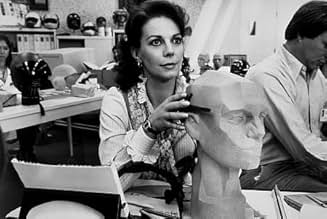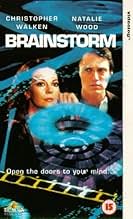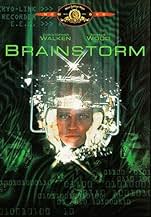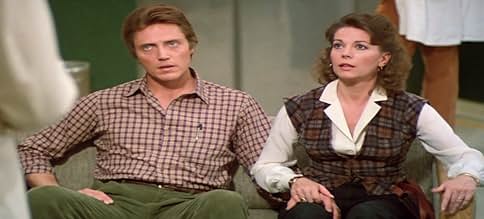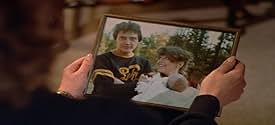Researchers develop a system where they can jump into people's minds. But when people involved bring their personal problems into the equation, it becomes dangerous - perhaps deadly.Researchers develop a system where they can jump into people's minds. But when people involved bring their personal problems into the equation, it becomes dangerous - perhaps deadly.Researchers develop a system where they can jump into people's minds. But when people involved bring their personal problems into the equation, it becomes dangerous - perhaps deadly.
- Awards
- 2 wins & 6 nominations
Ira David Wood III
- Barry
- (as David Wood)
Mary Fran Lyman
- Realtor
- (as Mary-Fran Lyman)
- Director
- Writers
- All cast & crew
- Production, box office & more at IMDbPro
Storyline
Did you know
- TriviaBecause of the immensely troubled production and disagreements with MGM, Douglas Trumbull opted never to direct a Hollywood film again. In 1983 he stated, "I have no interest . . . in doing another Hollywood feature film . . . Absolutely none. The movie business is so totally screwed-up that I just don't have the energy to invest three or four years in a feature film. Moviemaking is like waging war. It destroys your personal life, too. The people who can survive the process of making films have largely given up their personal lives in order to do that, just because it's such a battle to make a movie. And in doing that, they've isolated themselves from the very audience that they're trying to reach."
- GoofsSeveral of the tapes play back from a third-person perspective, which would be impossible if the tapes were actually a person's recorded memory.
- Quotes
Dr. Michael Anthony Brace: [whispers to statue] That's the girl I'm gonna marry.
- Crazy creditsAfter the final credit has rolled, 'TO NATALIE' appears for a couple seconds
- Alternate versionsIn the psychotic episode sequence when Michael's (Christopher Walken) son Chris (Jason Lively) wears the headset, there's a slight difference between the 70mm version and 35mm version. In the 70mm version of Chris's hallucination when Michael flips a lever presumably sending an electrical current to Chris's head, the camera cuts to and remains on a shot of a circular device with electricity running through it, as Michael is heard to say, 'Now you're gonna find out it's mine!' In the 35mm version, the shot arrangement is the same except that it cuts back to a closeup of Michael saying the line 'Now you're gonna find out it's mine!'
- ConnectionsEdited into Trumbull Land (2018)
Featured review
Everyone knows this was Natalie Wood's last film, and that some of her scenes were filmed after her death with a stand-in you only see from behind. Director Donald Trumball, best known for his special effects work in Blade Runner, Close Enounters, and Star Trek, chose this time to build his story on plot and character development, a good choice given the enormous talent he had to work with. Trumball's battle with studio execs to finish the film after Wood's death, rather than claim the insurance proceeds and call the film off, ended his career in Hollywood, but assured that this gem would not be lost. It is somewhat ironic that Natalie's swan song should be a sci-fi movie, since she was hardly known for work in the genre, but she brings a grace and charm, as well as depth and beauty, to the genre that is usually lacking.
Most sci-fi films based on technology don't age well, and there are times where this is no exception. The idea of recording on tape, let alone making tape loops, must seem like wax cylinder recordings to today's MP3 generation. The tapes themselves were props borrowed from a film being shot nearby, and that film was itself a dismal failure. But the concept is timeless, and so well done that, all in all, the film still works as well as it did in 1983.
Lesser screenplays would have been content with the main story line; scientists invent a way to record brainwaves and play them back for a real life out of body experience, and for just such a stinker, check out Strange Days. But then along comes the incomparable, utterly fabulous Louise Fletcher, who, as one of the co-inventors of the aforementioned device, records her death when she suffers a heart attack while working late one night. For the rest of the film, people are either trying to play the tape or prevent others from playing it. Meanwhile, the technology gets hijacked by two-dimensional government lackeys trying to exploit the weapons potential of the invention.
One can easily pick out scenes of this movie to vilify or exalt, all these years later, and any object viewed over time eventually has a vanishing point. The almost slapstick scene where the assembly robots go berserk is one example of a scene that, while consistent with its contemporaries, is silly today. The death scene, though much maligned, is equally misunderstood, and provides the metaphysical underpinnings that elevate Brainstorm above mere gadget flicks. Brainstorm is about exploring experience, life, love, even death, from the point of view of others, and Academy Award winner Louise Fletcher allows us to do so through her consummate skill in presenting a death scene of sufficient awe and wonder to warrant exploration.
If you want to find out what else happens, watch the film, but when you do, don't ignore the beautiful, delicate interplay between Christopher Walken and Natalie Wood. Their careening relationship seems somehow tied to the invention they helped make, and there are sequences so beautiful that I sometimes take out the DVD just to marvel at them.
Despite changing styles in special effects, this is a timeless and beautiful story that transcends the genre and, with Walken, Wood and Fletcher, becomes more than just a story about shiny gold tapes that record brain waves. It's more about immovable objects and irresistible forces and what happens when they collide. Intrigued? Good. Go watch it.
Most sci-fi films based on technology don't age well, and there are times where this is no exception. The idea of recording on tape, let alone making tape loops, must seem like wax cylinder recordings to today's MP3 generation. The tapes themselves were props borrowed from a film being shot nearby, and that film was itself a dismal failure. But the concept is timeless, and so well done that, all in all, the film still works as well as it did in 1983.
Lesser screenplays would have been content with the main story line; scientists invent a way to record brainwaves and play them back for a real life out of body experience, and for just such a stinker, check out Strange Days. But then along comes the incomparable, utterly fabulous Louise Fletcher, who, as one of the co-inventors of the aforementioned device, records her death when she suffers a heart attack while working late one night. For the rest of the film, people are either trying to play the tape or prevent others from playing it. Meanwhile, the technology gets hijacked by two-dimensional government lackeys trying to exploit the weapons potential of the invention.
One can easily pick out scenes of this movie to vilify or exalt, all these years later, and any object viewed over time eventually has a vanishing point. The almost slapstick scene where the assembly robots go berserk is one example of a scene that, while consistent with its contemporaries, is silly today. The death scene, though much maligned, is equally misunderstood, and provides the metaphysical underpinnings that elevate Brainstorm above mere gadget flicks. Brainstorm is about exploring experience, life, love, even death, from the point of view of others, and Academy Award winner Louise Fletcher allows us to do so through her consummate skill in presenting a death scene of sufficient awe and wonder to warrant exploration.
If you want to find out what else happens, watch the film, but when you do, don't ignore the beautiful, delicate interplay between Christopher Walken and Natalie Wood. Their careening relationship seems somehow tied to the invention they helped make, and there are sequences so beautiful that I sometimes take out the DVD just to marvel at them.
Despite changing styles in special effects, this is a timeless and beautiful story that transcends the genre and, with Walken, Wood and Fletcher, becomes more than just a story about shiny gold tapes that record brain waves. It's more about immovable objects and irresistible forces and what happens when they collide. Intrigued? Good. Go watch it.
Details
- Release date
- Country of origin
- Language
- Also known as
- The Gordon Forbes Tapes
- Filming locations
- Research Triangle Park, North Carolina, USA(Burroughs Wellcome Pharmaceutical Corporation HQ)
- Production companies
- See more company credits at IMDbPro
Box office
- Budget
- $15,000,000 (estimated)
- Gross US & Canada
- $10,219,460
- Opening weekend US & Canada
- $1,196,965
- Oct 2, 1983
- Gross worldwide
- $10,219,460
- Runtime1 hour 46 minutes
- Color
Contribute to this page
Suggest an edit or add missing content




